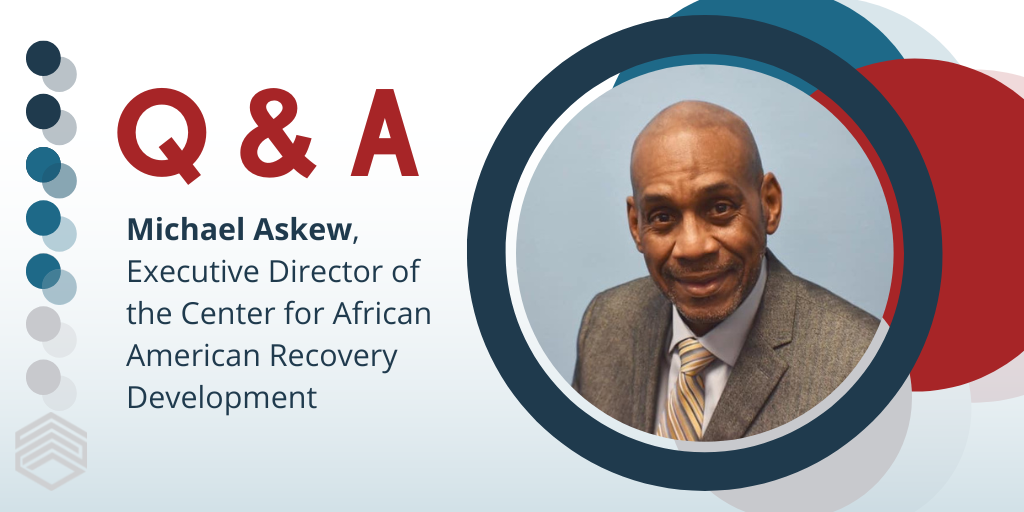Given your experience of incarceration and addiction, what are two critical life experiences you feel comfortable sharing that have helped in your recovery?
I’m celebrating my thirty-third year of sustained recovery from a substance use disorder after a cycle of incarceration with 11 arrests and 6 convictions. I first learned about 12-step fellowship in prison, and it turned me around.
When I was 34 years old, I was diagnosed with HIV, and I was ready to give up. I remember waking up in a dark, isolated jail. I said to myself, “I can’t keep doing this. I have to make a change.” I knew that if I could stop doing drugs in prison, I’d have a chance. I began to go to twelve-step meetings. I started engaging myself in meaningful activities and opportunities. One night, I was studying the Bible and began praying. I said, “God, if you just take this away from me, I will proclaim your name to the world.” God keeps his promise, and I’ve been doing this work ever since.
The second life-changing experience was the last time I was released from prison and went to a halfway house. I spent 18 months there and continued to go to 12-step meetings. I got a great job as a shipping and receiving clerk. I loved my job and got a promotion despite having a felony on my record.
Once I completed the halfway house, I felt like a model citizen. After a year, I got a call from the director, who asked me if I’d be willing to facilitate a support group for residents. That moment made me feel worthy, which was another spiritual awakening.
You are a part of the Black Recovery Movement, which aims to bring effective addiction services to the Black community. How is recovery different for Black Americans compared to groups of other races or ethnicities?
Where I grew up, in a low-income housing project in Connecticut, no one talked about recovery. My circle was small, and recovery was not accessible. In some Black communities, people may not have access to resources or have role models for how to access optimal services, engage in treatment, or achieve recovery.
With the Black Recovery Movement, we’re looking to bring cultural congruency to recovery support services for marginalized communities of African Americans. When you look at Black communities, there is a definite impact in those communities regarding trauma, social determinants of health, and health disparities. We want these communities exposed to recovery, and we want to develop culturally congruent recovery options that will sustainably benefit communities of color.
You have recently become the Director of the Center for African American Recovery Development (CAARD). What is the mission of CAARD, and what are you doing to achieve it?
CAARD is the culmination of the passion that drives the Black Recovery Movement. Thirty years ago, in 1996, I was introduced to a statewide recovery committee organization, Connecticut Community for Addiction Recovery (CCAR), where I volunteered in 1998 and was hired in 2000. In this role, I met leaders in the recovery field from the African American community, and we kept in touch. We shared the goal of bringing culturally congruent recovery support services to all African Americans.
Eventually, in 2021 this group of individuals came together as CAARD and started working to examine data associated with African Americans and recovery. Dr. Bettina Hoeppner, the associate director of research of the Recovery Research Institute at Massachusetts General Hospital, helped and supported our research goals. We wanted to find datasets on mortality, suicide, poverty, economic and social disadvantages, incarceration, and employment for African Americans. We then found the top five cities where recovery services and health outcomes for African Americans were the worst. Those cities are Memphis, Tennessee; New Orleans, Louisiana; Wilmington, Delaware; Baltimore, Maryland; and Detroit, Michigan. We determined Memphis was the worst due to its lack of an African American community recovery organization.
So, we put our research findings to work by engaging with community members from Memphis.
CAARD members spent 3 days with the Memphis community, meeting with practitioners, health providers, and executive directors from treatment and recovery programs, along with the police and first responders. CAARD’s mission is to “advance the development and sustainability of African American recovery community organizations through capacity building, education, and advocacy.” This meeting is the first step to establishing a community recovery organization in Memphis.
You work to remove barriers that prevent people from “living the abundantly full life they deserve.” What beautiful or enjoyable aspects of your day contribute to an abundant life?
I think about a life with meaning and purpose. I’ve lived with HIV for 34 years, and in 2015 I was diagnosed with stage four Hepatitis C—end-stage liver disease. I told my doctor, “I want to find the true meaning of life.” She said, “Well, Michael, the only way you’re going to do it is through seeking.”
I began to ask myself, “what are some things I always wanted to do but never got to?” I wanted to travel, play golf, and enjoy having grandchildren; all these dreams have come true. It’s just about choosing opportunity. Through recovery, I had a divine intervention, that spiritual awakening. If you have that awakening, I tell people to open their hearts to it because life is so full and rewarding in unimaginable ways.
Like what you’ve read? Sign up to receive the monthly GAINS eNews!


